Pavlova
- By Jennifer Segal
- Updated June 25, 2025
- 33 Comments
- Leave a Review

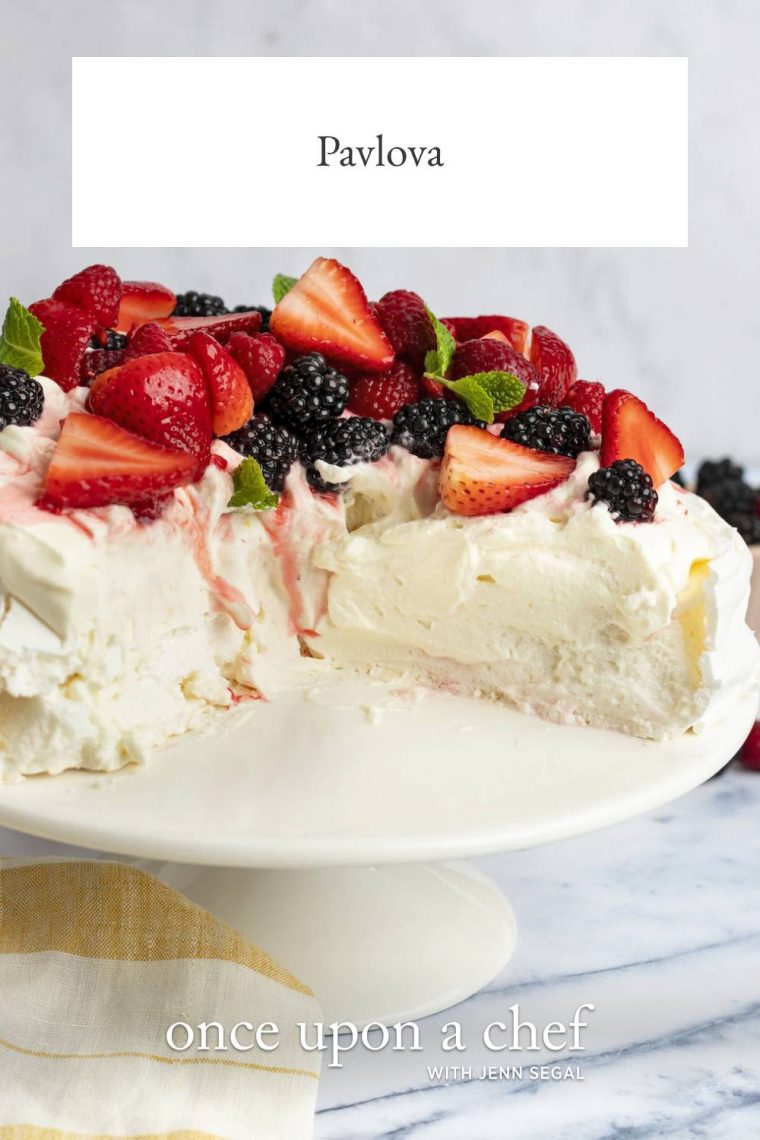
This post may contain affiliate links. Read my full disclosure policy.
Dress up your dessert table with this gorgeous pavlova—a light, cloud-like dessert with a crisp, marshmallowy meringue, rich whipped topping, and fresh berries. Perfect for any special occasion. (Bonus: it’s gluten-free!)
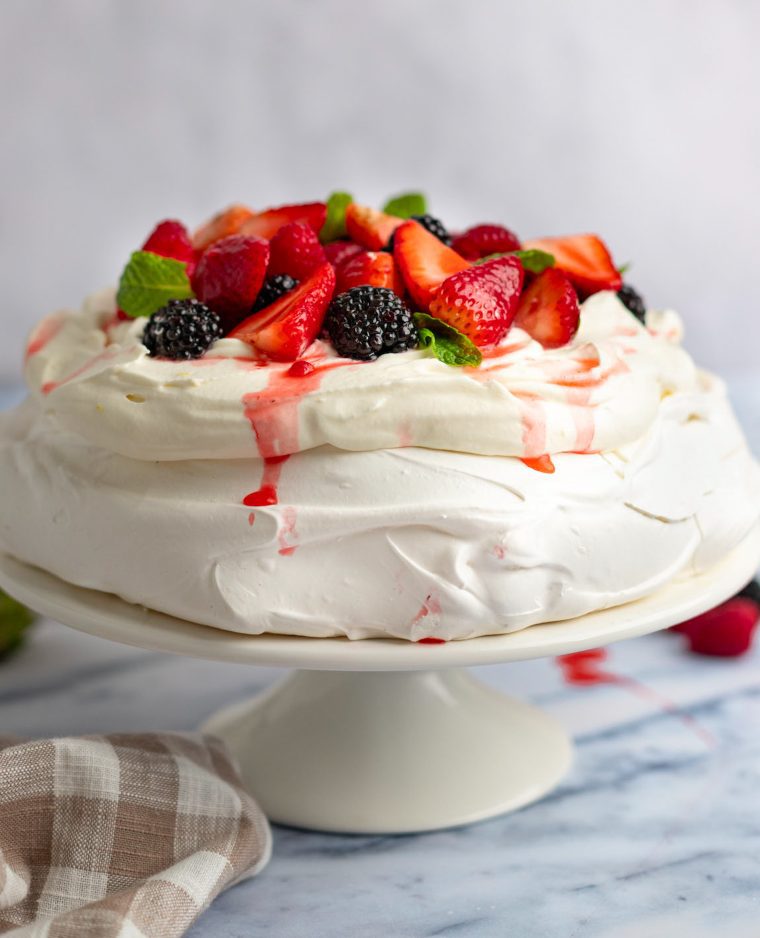
Pavlova, named after the Russian ballerina Anna Pavlova, is a wonderfully light dessert with a crisp meringue shell and soft, marshmallowy center, all piled high with whipped cream and fresh fruit.
My fruit pavlova recipe takes this classic up a notch with a couple simple tricks. First, I enrich the whipped cream with mascarpone cheese—it adds just the right amount of richness to make the dessert feel a little more decadent. Then, I macerate the berries in sugar and lemon juice. It’s a quick step that really makes the flavors pop and takes the dessert to the next level.
This fruit topped pavlova is truly a show-stopper—perfect for special occasions, holidays, or dinner parties. And if you’re looking for more fancy fruit desserts, be sure to check out my French fruit tart and fresh berry terrine.
“This dessert turned out so beautifully – I even impressed myself!”
What You’ll Need To Make Pavlova
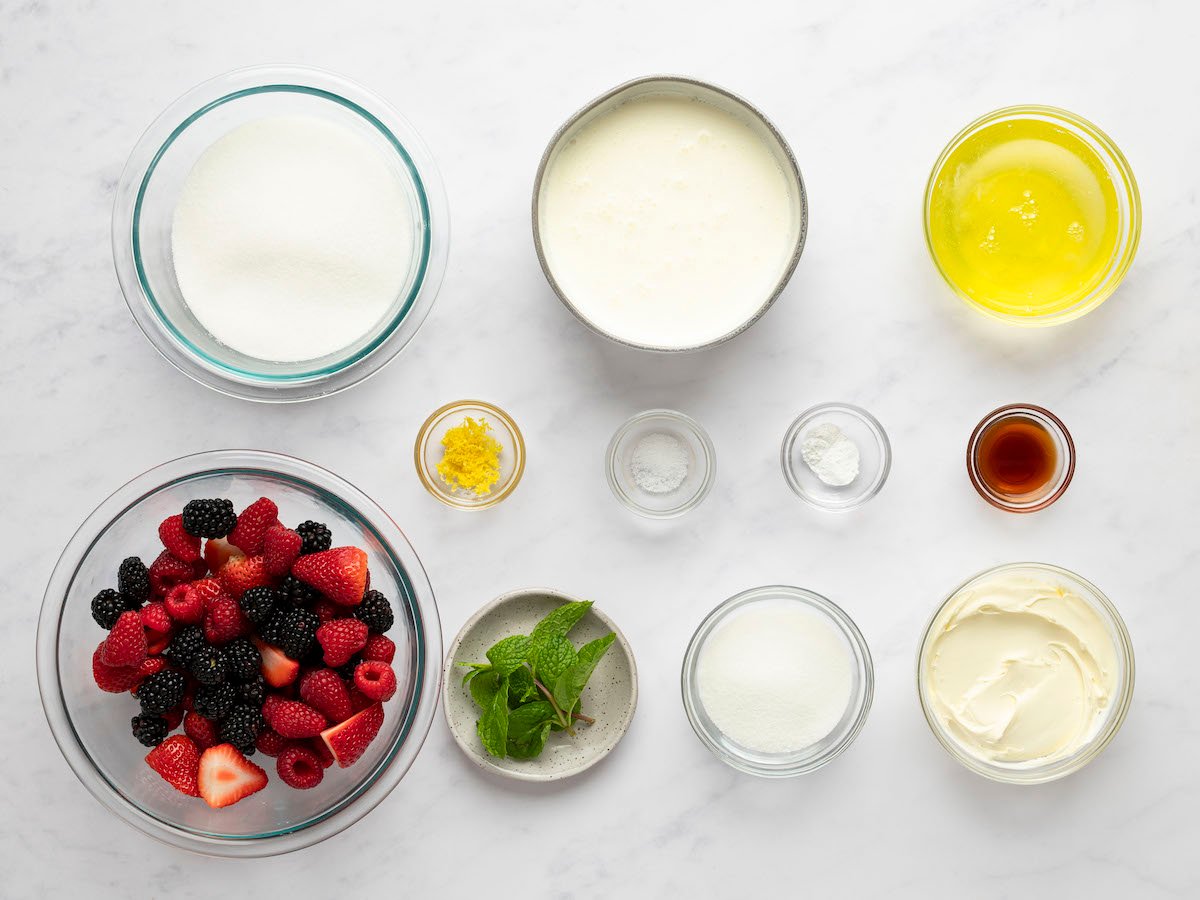
- Egg Whites: These give the pavlova its structure and airy texture. Use room temperature eggs—they whip up faster and fluffier than cold ones. If you’re separating eggs straight from the fridge, let the whites sit out for a bit before whipping. Save the yolks to make a batch of hollandaise sauce or crème brûlée.
- Cream of Tartar: Stabilizes the egg whites for the meringue pavlova so the dessert holds its shape.
- Sugar: Superfine sugar dissolves easily into the meringue for a smooth finish. If you don’t have any, just blitz granulated sugar in the food processor for about 30 seconds. Granulated sugar sweetens the topping.
- Vanilla Extract & Lemon Zest: Vanilla adds that classic, warm flavor to the base, while lemon zest adds a fresh, citrusy note to the topping.
- Cornstarch: Keeps the inside of the pavlova soft and marshmallowy while helping the outside stay crisp.
- Mascarpone Cheese & Whipped Cream: This combo makes the base of the whipped topping—the addition of mascarpone makes it more decadent than whipped cream alone.
- Mixed Berries: A mix of sweet and tart, they’re the perfect juicy finish—use whatever berries look best. You can macerate them (see instructions below) or use them as is.
- Jump to the printable recipe for precise measurements
Step-By-Step-Instructions for how to make Pavlova
Step 1: Prep the oven and baking sheet. Preheat the oven to 250°F and set an oven rack in the center. Line a baking sheet with parchment paper and trace a 9-inch circle on it using a cake pan or plate.
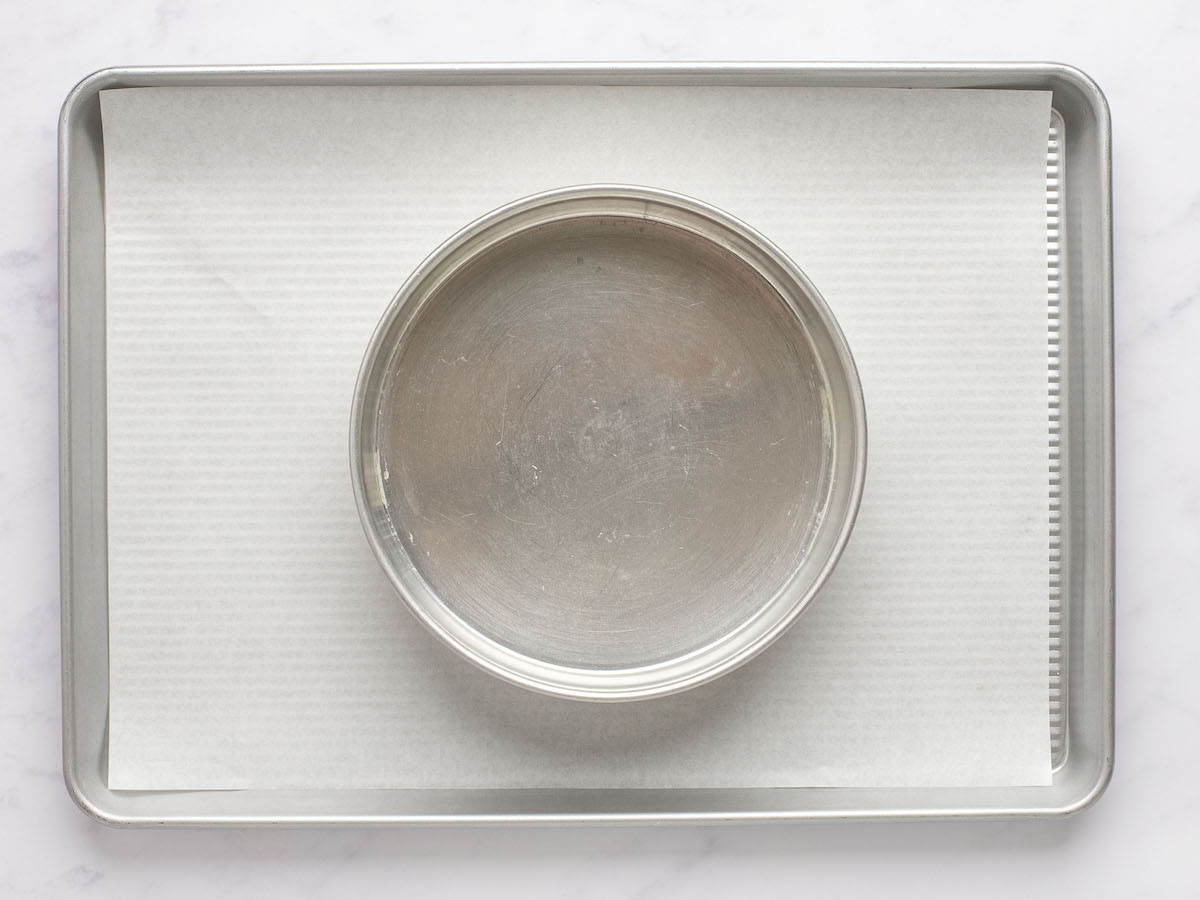
Step 2: Start the meringue. Add the egg whites to the bowl of a stand mixer and beat on medium speed until foamy, about 1 minute. Add the salt and cream of tartar.
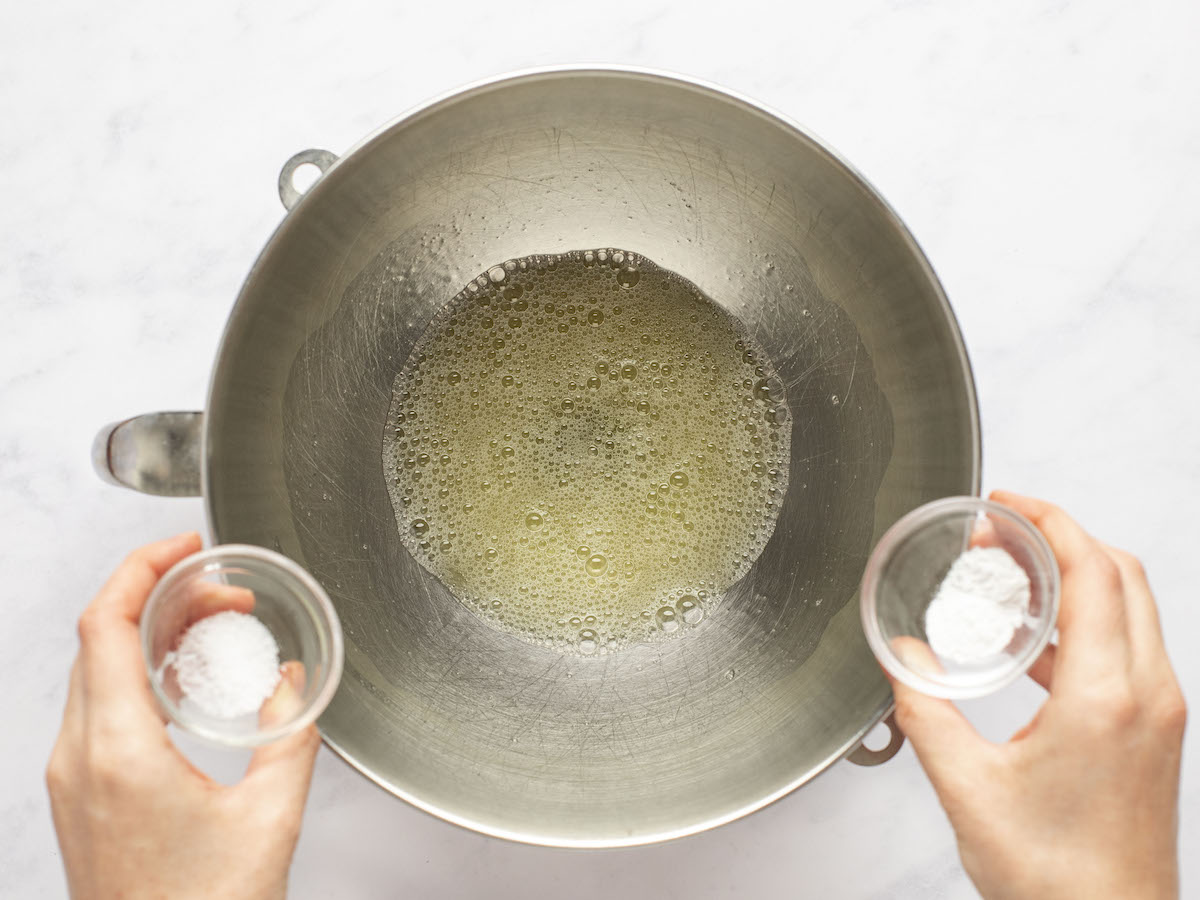
Step 3: Add the sugar. Beat until soft peaks form, about 2 minutes, then gradually add the sugar, one tablespoon at a time.
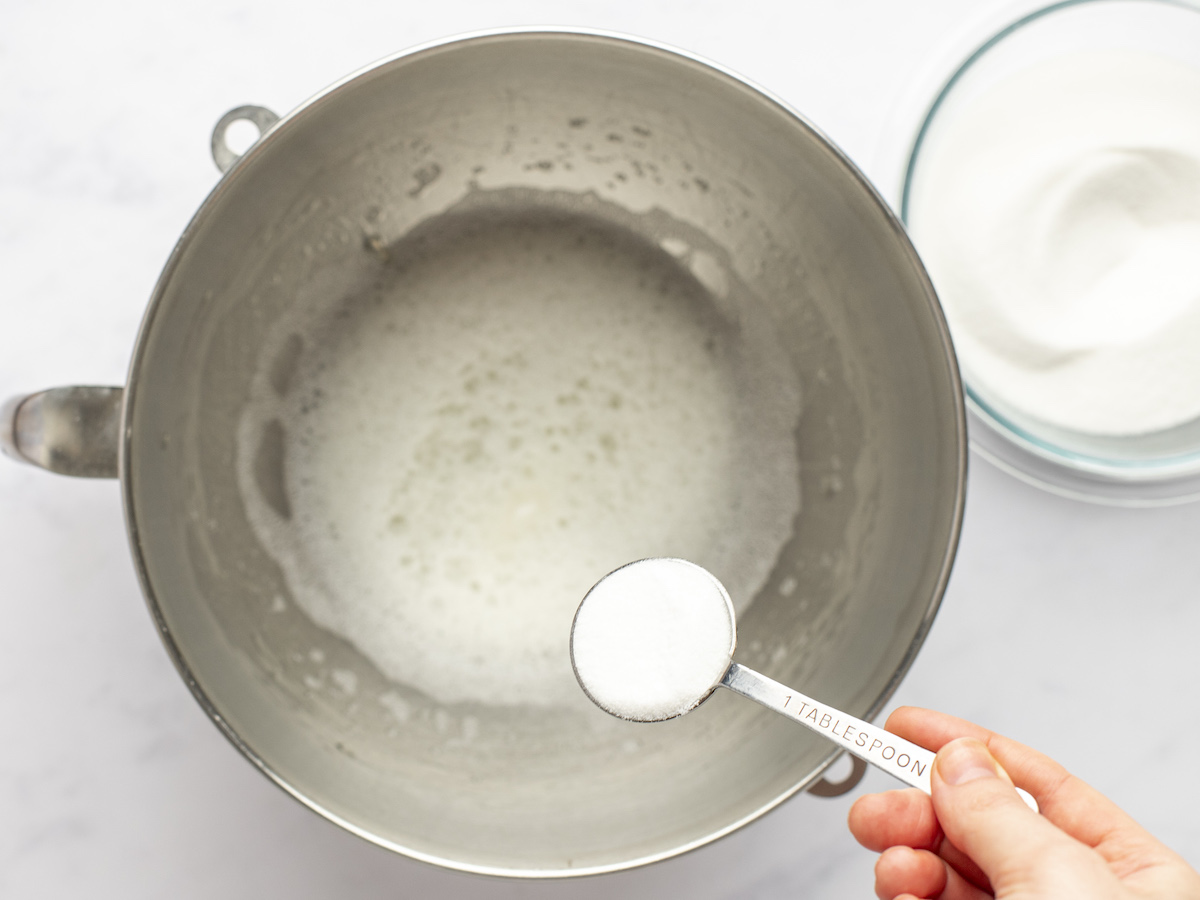
Step 4: Whip to stiff peaks. Increase the speed to medium-high and beat until glossy and stiff, about 5 minutes. Don’t rush through this step. You want the meringue to be so stiff that it holds its shape when you lift the whisk. This ensures a sturdy base for the pavlova. Add the vanilla and cornstarch, and beat for another 30 seconds.
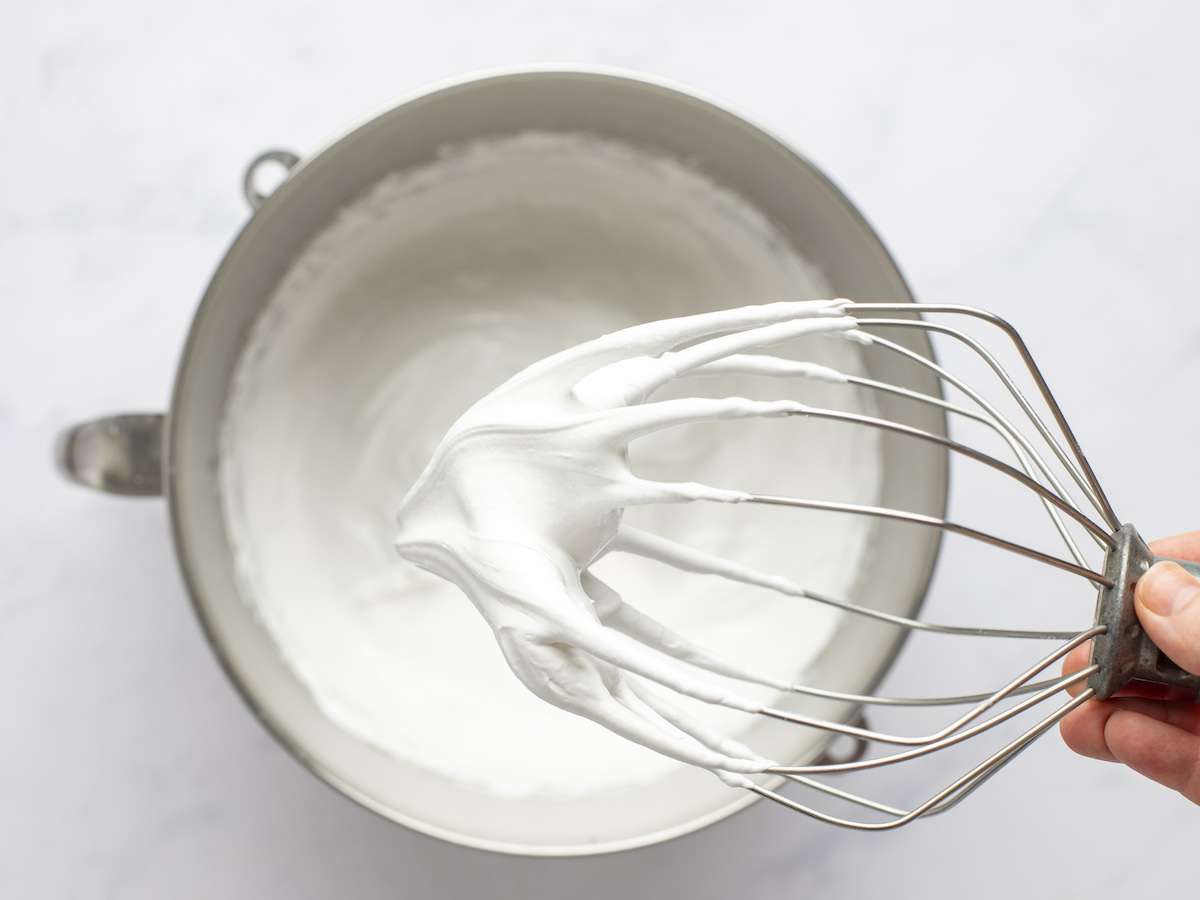
Step 5: Shape the meringue. Mound the meringue onto the circle on the parchment, then spread it out, smoothing the top and sides slightly. When spreading the meringue onto the baking sheet, create a very small well in the center. This makes a perfect spot for the whipped cream later on. After creating the well, even out the top and sides just slightly—it shouldn’t be perfectly smooth or overworked.
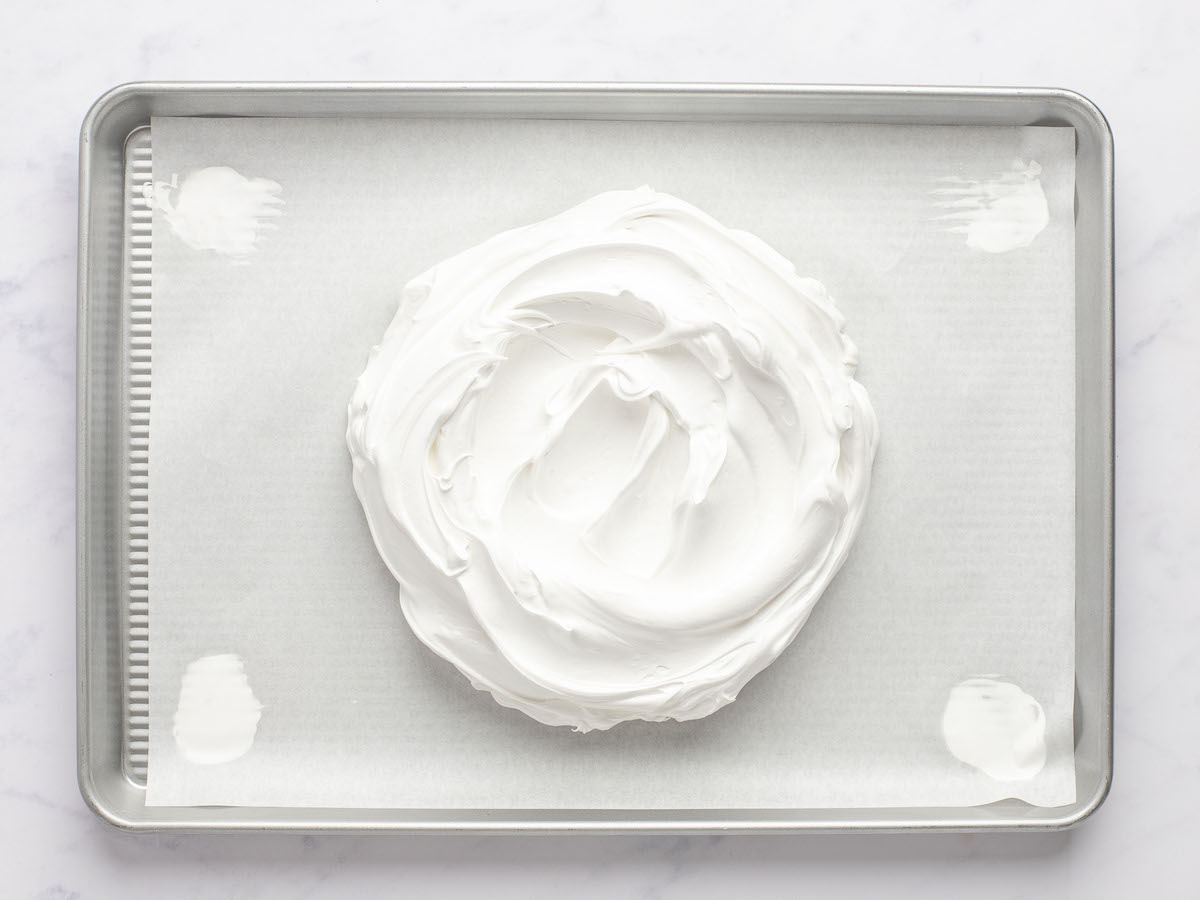
Step 6: Bake and cool the meringue. Bake for 85 to 90 minutes until dry and crisp. Turn off the oven, prop the door open, and let it cool inside for 1 hour. After cooling, the meringue can be stored at room temperature in an airtight container for up to 1 day.
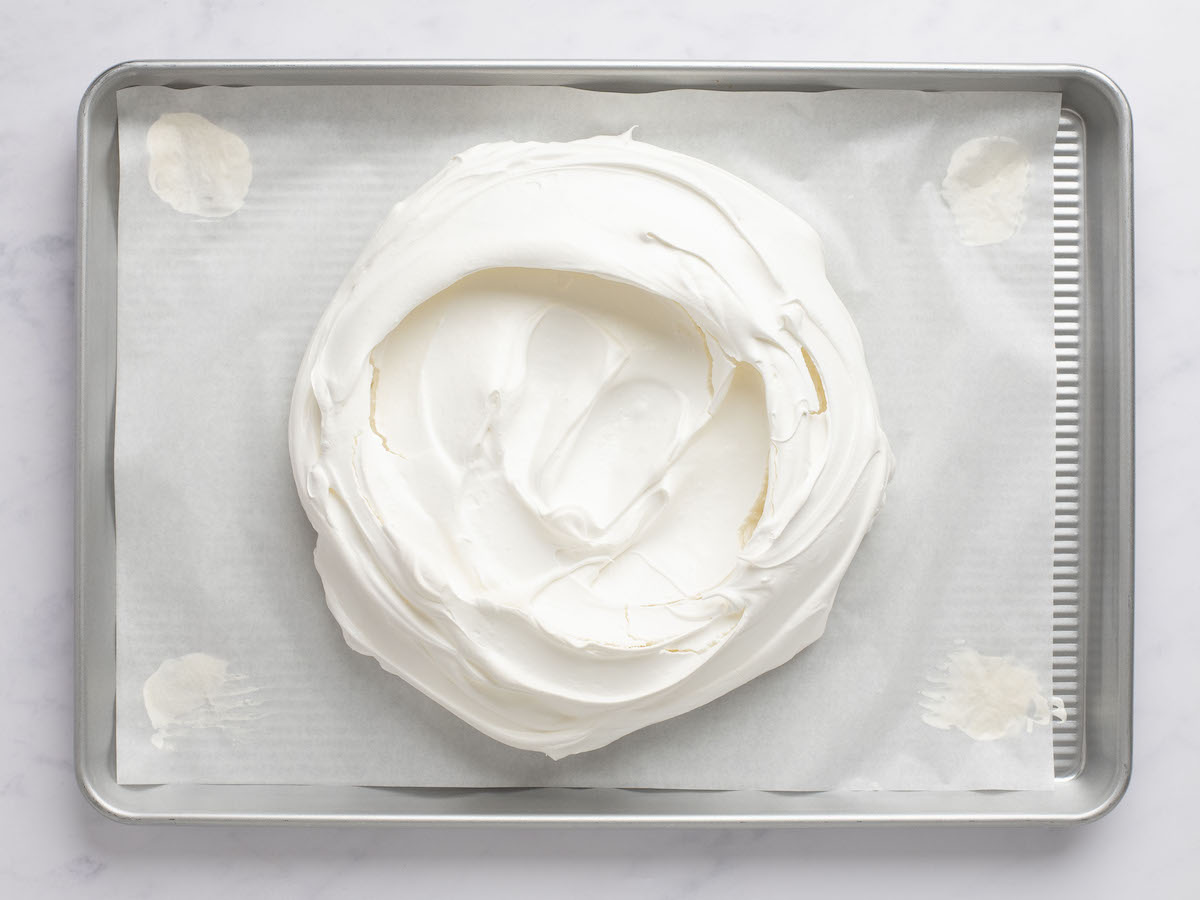
Step 7: Make the topping. Add the mascarpone, heavy cream, sugar, vanilla, and lemon zest to a mixing bowl. Beat on low to combine, then on medium-high until medium-stiff peaks form, a few minutes. Use the cream immediately or chill it in the fridge for up to 2 hours before serving.
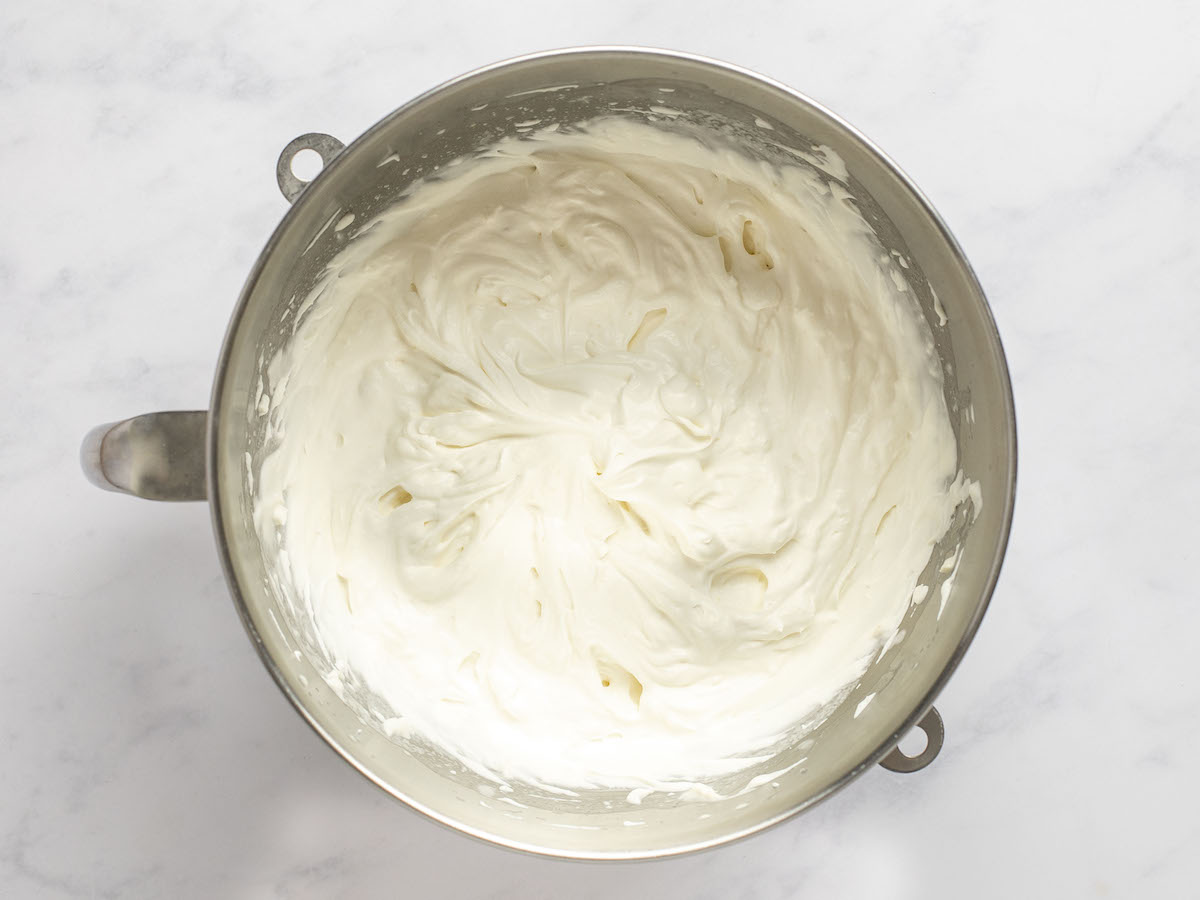
Step 8: Macerate the berries. Gently mix the berries with lemon juice and sugar. Allow to sit at room temperature until juicy.
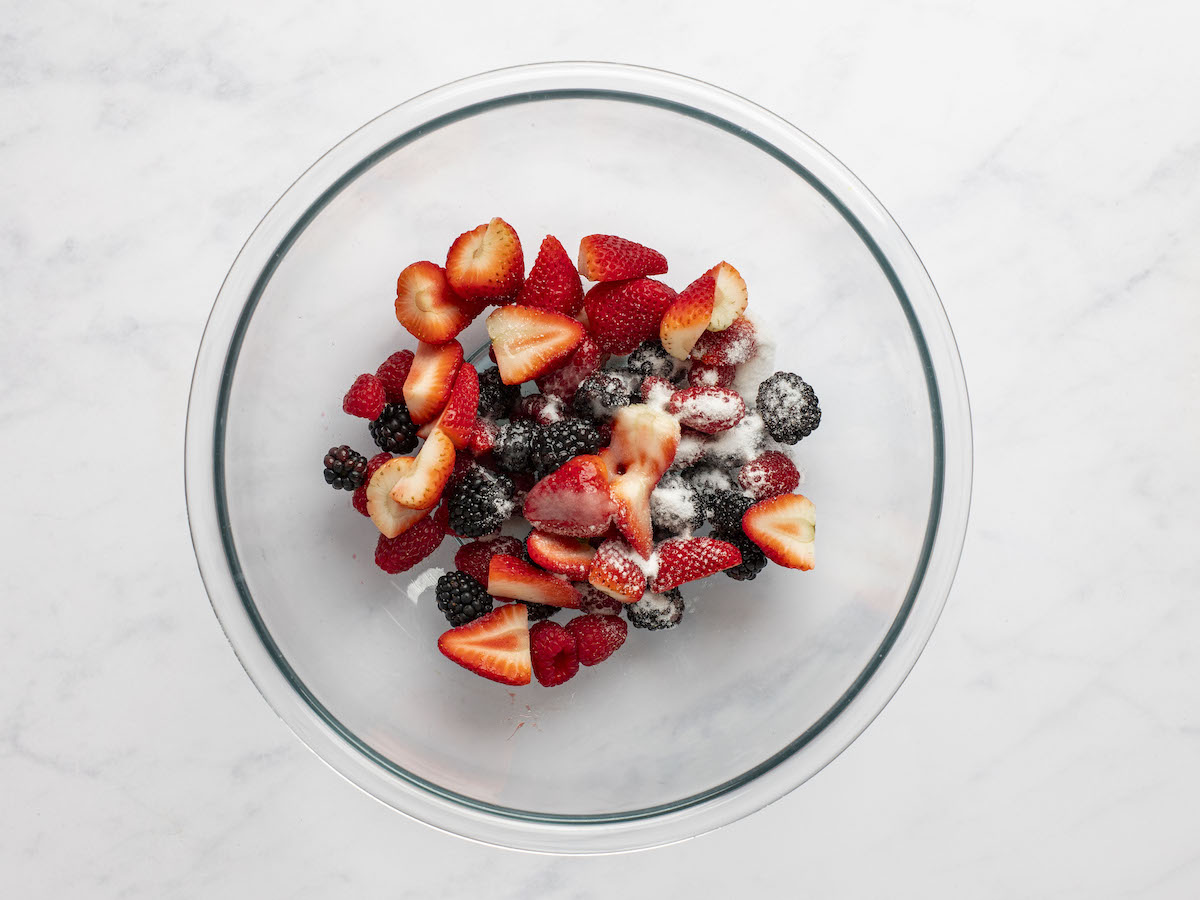
Step 9: Assemble the pavlova. Place the meringue on a serving platter and spread the mascarpone cream over the top, leaving about a 1-inch border around the edge.
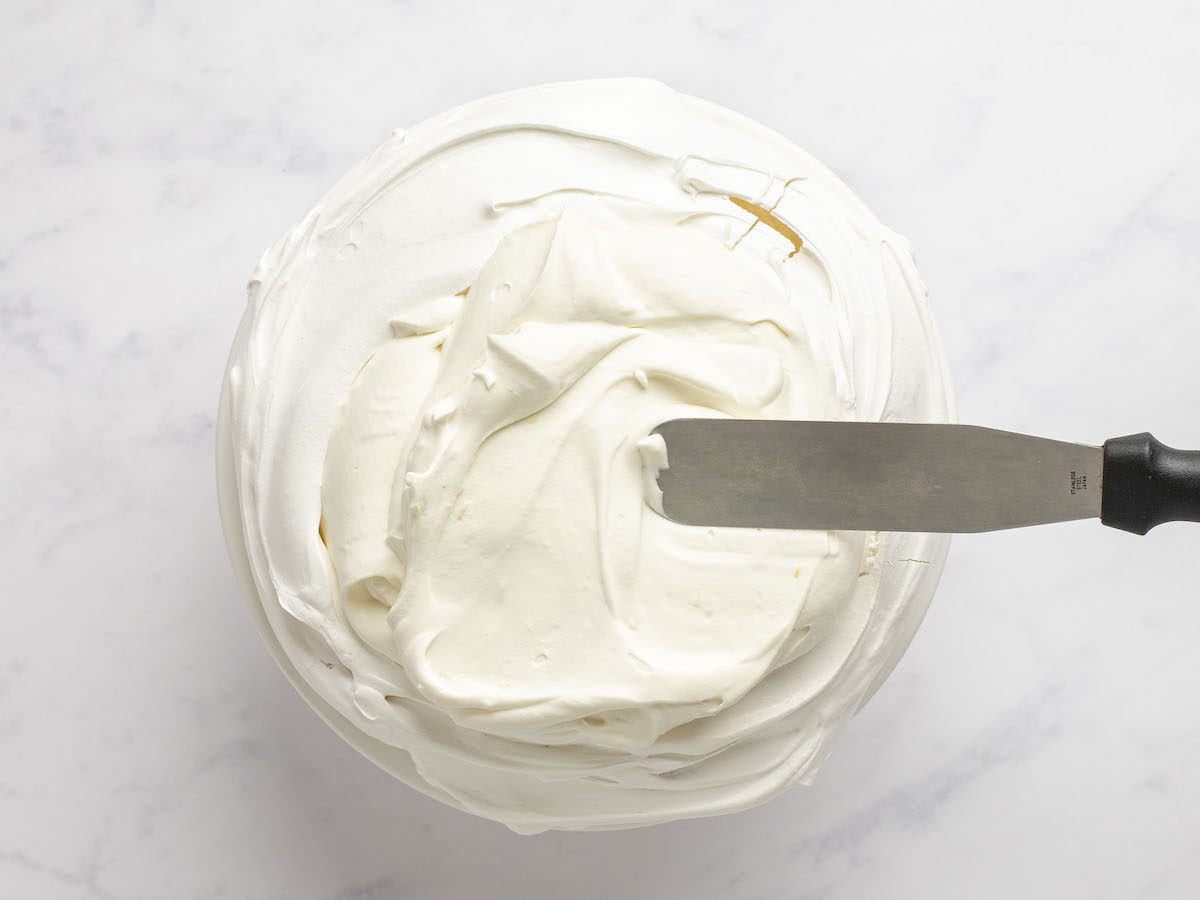
Step 10: Top with berries and serve. Right before serving, spoon the fresh or macerated berries over the cream, then top with lemon zest and fresh mint.
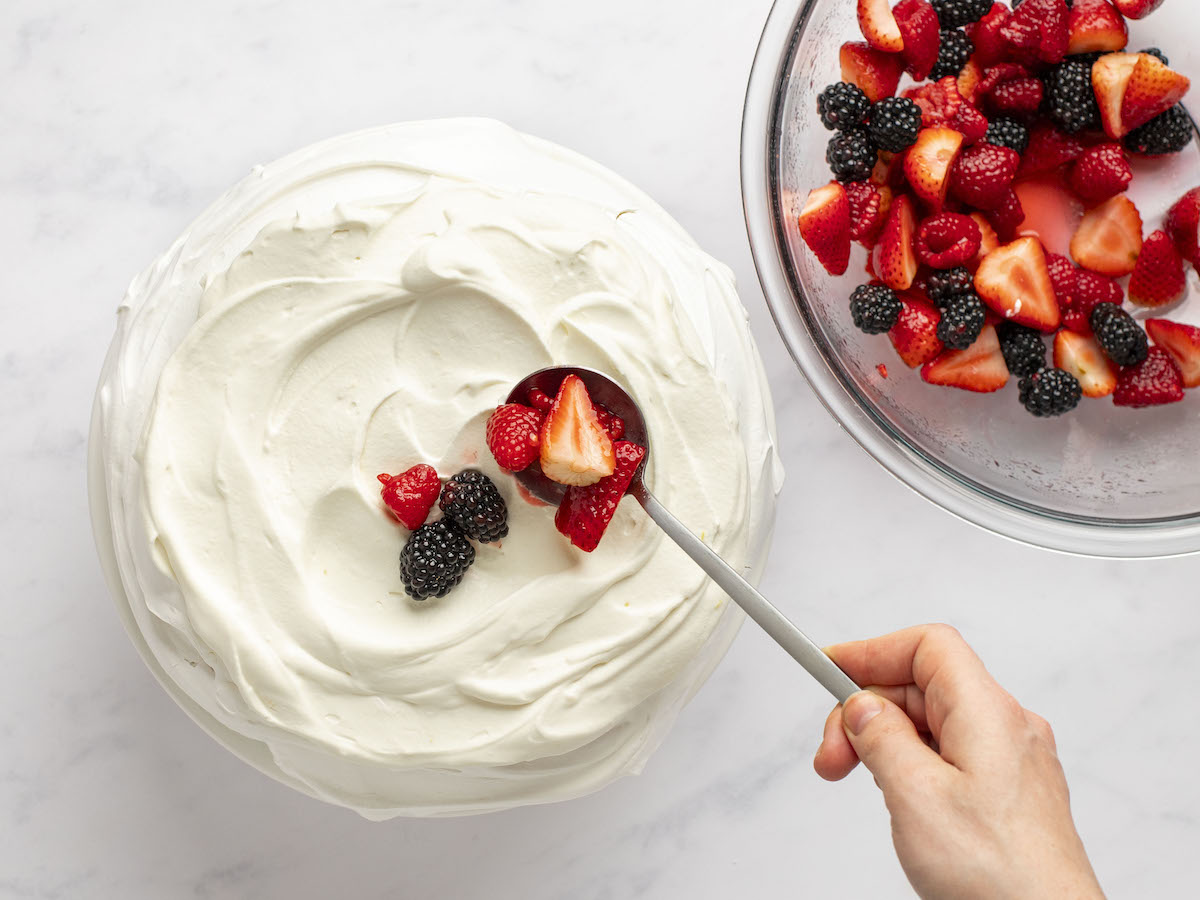
Jenn’s Pro Tips for the Best Pavlova Recipe
- Cool Properly. It’s important to cool meringue gradually. Start by letting it cool in the oven after it’s done baking. This helps the delicate structure settle slowly without stress, keeping it from cracking.
- Make Ahead. You can make the pavlova meringue up to one day ahead. Be sure to store and wrap it up once it’s fully cool to keep it fresh. The mascarpone meringue and macerated fruit can be made a few hours ahead but wait to assemble the pavlova until you’re ready to serve.
- Leftovers. Once you’ve added the whipped topping, it’s best to serve immediately. Leftover pavlova doesn’t keep well.
- Mini Pavlovas: This recipe works great for making mini pavlovas too. Just shape smaller meringues and bake them on separate sheets—check the recipe card below for full baking instructions and tips.
- Passover Tip: If you’re preparing this dessert for Passover (highly recommend!), you can omit the cornstarch to keep it kosher for the holiday. The texture might be slightly different, but your pavlova will still be delicious.
Video Tutorial
More Meringue Recipes You May Like
Pavlova

With layers of crisp meringue, whipped cream, and fresh berries, this classic pavlova is truly a show-stopper.
Ingredients
For the Pavlova
- 6 large egg whites, at room temperature
- ⅛ teaspoon salt
- ½ teaspoon cream of tartar
- 1½ cups superfine sugar
- 1 teaspoon vanilla extract
- 1½ teaspoons cornstarch (see note)
For the Whipped Topping
- 8 ounces (1 cup) mascarpone cheese, cold
- 2 cups (1 pint) heavy cream, cold
- 6 tablespoons granulated sugar
- 1½ teaspoons vanilla extract
- 1 teaspoon (packed) finely grated lemon zest, from 1 lemon
- Pinch salt
For the Fruit Topping
- 1 pound (3 cups) mixed berries or macerated berries (see recipe below)
- A few fresh mint leaves (optional)
Instructions
For the Meringue
- Preheat the oven to 250°F and set an oven rack in the middle position. Line a baking sheet with parchment paper. Using a dark marker, draw a 9-inch diameter circle on the parchment paper by tracing around a 9-inch cake pan or plate. Flip the paper over so your meringue won't touch the marker. Set aside.
- Add the egg whites to the bowl of a stand mixer and beat on medium speed (6) until the egg whites become foamy, about 1 minute. Add the salt and cream of tartar and beat until the mixture forms soft peaks, about 2 minutes. Gradually add the granulated sugar, about one tablespoon at a time, continuing to beat (this should take about 1 minute). Once all the sugar is added, increase the speed to medium-high (8) and beat until the meringue is glossy and holds stiff peaks, 5 to 7 minutes more. (When you lift the beater out of the bowl, the meringue should form peaks that stand straight up without drooping.) Add the vanilla and cornstarch and beat for about 30 seconds more, until combined.
- Secure the parchment paper to the baking sheet by adding a dab of meringue under each corner to act as a glue. Mound the meringue onto the parchment inside the circle. Using a spatula or a butter knife, spread the meringue to fill the circle and ever-so-slightly indent the center of the circle to fill with the whipped topping later on. Even out the top and sides just slightly -- it shouldn’t be perfectly smooth or overworked.
- Place in the oven and bake for 85 to 90 minutes, or until the meringue is dry and crisp all over. Don't worry if the top or edges are cracked -- that's normal and it all gets covered with whipped cream in the end. Turn off the oven, prop the oven door open, and leave the meringue in the oven to cool to room temperature for 1 hour. (The meringue won’t collapse as much if it cools gradually.)
For the Whipped Topping
- Wash your mixing bowl from the meringue. To the clean bowl, add mascarpone cheese, heavy cream, sugar, vanilla, and lemon zest. Whisk on low speed until combined, then increase the speed to medium-high and beat until billowy, medium-stiff peaks form, 1 to 2 minutes. Be cautious not to over-beat; the mixture should retain a smooth consistency without becoming overly stiff or taking on a curdled-like appearance.
For Assembling
- To assemble, carefully peel the meringue off of the parchment paper and place it on a serving platter. Alternatively, if the pavlova is difficult to remove, transfer it on the parchment to a platter (you can trim the parchment to a smaller square if necessary.) Mound the mascarpone cream onto the meringue and gently spread it out until it is about 1 inch from the edge (don't worry if the meringue cracks in the process). Top the pavlova with the fresh or macerated berries and fresh mint.
- Note: The cornstarch in this pavlova recipe serves to stabilize the egg whites and help create a fluffy, marshmallow-like center beneath the crisp exterior. However, if you're preparing this dessert for Passover, you can omit the cornstarch to keep the recipe kosher for the holiday. While the texture might be slightly different without the cornstarch, your pavlova will still be perfectly delicious.
- To Make Mini Pavlovas: Shape 8 to 10 small meringues with a slight indentation in the center (to hold the whipped topping later) on two parchment-lined baking sheets, leaving space for them to spread a bit. Position the sheets in the upper and lower thirds of the oven. Bake for 50 to 55 minutes, or until the pavlovas are crisp and dry. Then, turn off the oven and prop open the door slightly; let the meringues cool inside to room temperature, which should take about one hour.
- To Make Macerated Berries: If you'd like to top the pavlova with macerated berries, begin with 1 pound (3 cups) mixed berries, 1 tablespoon lemon juice and 2 tablespoons granulated sugar. If using strawberries, hull them and cut into halves or quarters if large. Leave smaller berries like blueberries, raspberries, and blackberries whole. Ensure all the berries are clean and dry. In a medium bowl, gently mix the prepared berries with the lemon juice and sugar. Allow the mixture to sit at room temperature for 30 minutes to 1 hour. During this time, the sugar will dissolve and the berries will release their juices, creating a light, natural syrup.
- Make-Ahead Instructions: The meringue base can be made 1 day ahead of time and stored in an airtight container at room temperature; avoid refrigerating it, as the humidity can soften the structure. The whipped topping can be prepared and refrigerated up to 2 hours before serving. When ready to serve, carefully transfer the pavlova to a serving plate. Add the whipped topping and fresh fruit only just before serving to ensure the meringue remains crisp, preventing it from becoming soft due to the moisture from these toppings.
- Nutritional Note: The nutritional information includes the fresh berries and mint.
Nutrition Information
Powered by ![]()
- Per serving (10 servings)
- Calories: 422
- Fat: 25 g
- Saturated fat: 16 g
- Carbohydrates: 46 g
- Sugar: 43 g
- Fiber: 1 g
- Protein: 5 g
- Sodium: 160 mg
- Cholesterol: 77 mg
This website is written and produced for informational purposes only. I am not a certified nutritionist and the nutritional data on this site has not been evaluated or approved by a nutritionist or the Food and Drug Administration. Nutritional information is offered as a courtesy and should not be construed as a guarantee. The data is calculated through an online nutritional calculator, Edamam.com. Although I do my best to provide accurate nutritional information, these figures should be considered estimates only. Varying factors such as product types or brands purchased, natural fluctuations in fresh produce, and the way ingredients are processed change the effective nutritional information in any given recipe. Furthermore, different online calculators provide different results depending on their own nutrition fact sources and algorithms. To obtain the most accurate nutritional information in a given recipe, you should calculate the nutritional information with the actual ingredients used in your recipe, using your preferred nutrition calculator.
Gluten-Free Adaptable Note
To the best of my knowledge, all of the ingredients used in this recipe are gluten-free or widely available in gluten-free versions. There is hidden gluten in many foods; if you're following a gluten-free diet or cooking for someone with gluten allergies, always read the labels of your ingredients to verify that they are gluten-free.
See more recipes:
Comments
Add a Comment Cancel reply
This site uses Akismet to reduce spam. Learn how your comment data is processed.
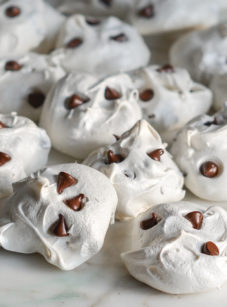
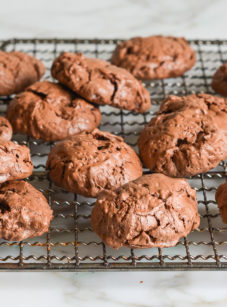
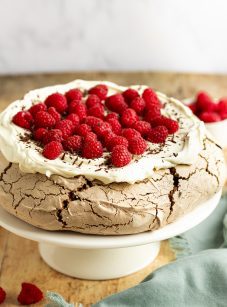
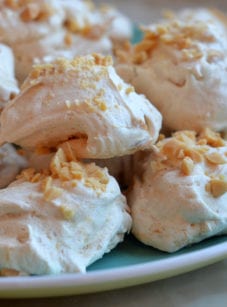
My pavlova was really nice to eat and impressed me and my family! Thank you so much for writing this recipe and answer all of my many questions!
Hi Jenn,
I love this recipe and I make it every year for Passover (I substitute the cornstarch for potato starch). Could I freeze the pavlova? Also, how many can I bake at once in the oven? Would that make any difference in the outcome? Thank you!
Hi Ellen, so glad you like it! You may be able to freeze the meringue portion of the Pavlova, but I’ve never done it, and I’m not sure how it would impact the texture. And I think you could get away with baking two of these at the same time. Bake time may be just a touch longer, but keep a close eye.
Hi Jenn,
I have recently been looking for pavlova recipes and came across yours. It looks really good and i am sure it will be. I looked at the ingredients and had two questions. Firstly, instead of using lemon zest can I use lemon juice or are they the same thing? My second question is if you know any shops which have mascarpone cheese and tartar? I have never made a pavlova and never heard of these ingredients before. It would really be appreciated for a reply soon!
Hi Isabel, lemon juice and lemon zest are different. Lemon zest is the thin outer layer of the lemon peel — the bright yellow part — that’s finely grated to add a citrusy aroma and flavor. I don’t recommend replacing it with lemon juice. The great majority of grocery stores carry cream of tartar; look in the spice or baking aisle near spices or baking powder. And mascarpone is pretty readily available in larger well-stocked supermarkets in the dairy or specialty cheese section, but if you can’t find it in yours, I’d suggest looking at Whole Foods or Wegmans; they usually have a wider cheese section.
I went to the supermarket yesterday and found all the ingredients apart from lemon zest. I am planning to check a different place today but it I cant find it, what should I replace it with?
Glad you found the cream of tartar and mascarpone! And I’m sorry if I wasn’t clearer, but lemon zest comes from fresh lemons; you’ll need one lemon to yield 1 teaspoon of zest.😊
Thank you so much! My very last question is do is it 100% necessary to use superfine sugar? I couldn’t find it around me at all.
No problem – just place regular granulated sugar in a food processor and pulse until fine, about 30 seconds.
I’m sorry but I just can’t leave a recipe alone. I added vanilla and 1/2 cup per 6 eggs of coconut. It was amazing!!! ❤️
Thank you for this beautiful dish that handled my finagling.
Will the meringue shell last 2 days if I make it on a Thursday and fill and serve it on a Saturday?? Thanks Jenn -for your input here! I am a longtime lover of your recipes💝
Hi Betsy, so glad you liked the recipes! I don’t recommend making the Pavlova more than one day ahead – sorry!
Hi Jenn,
What should be the diameter of the mini pavlovas? Thank you so much for great recipes!
I’d make them 3 to 4 inches in diameter.